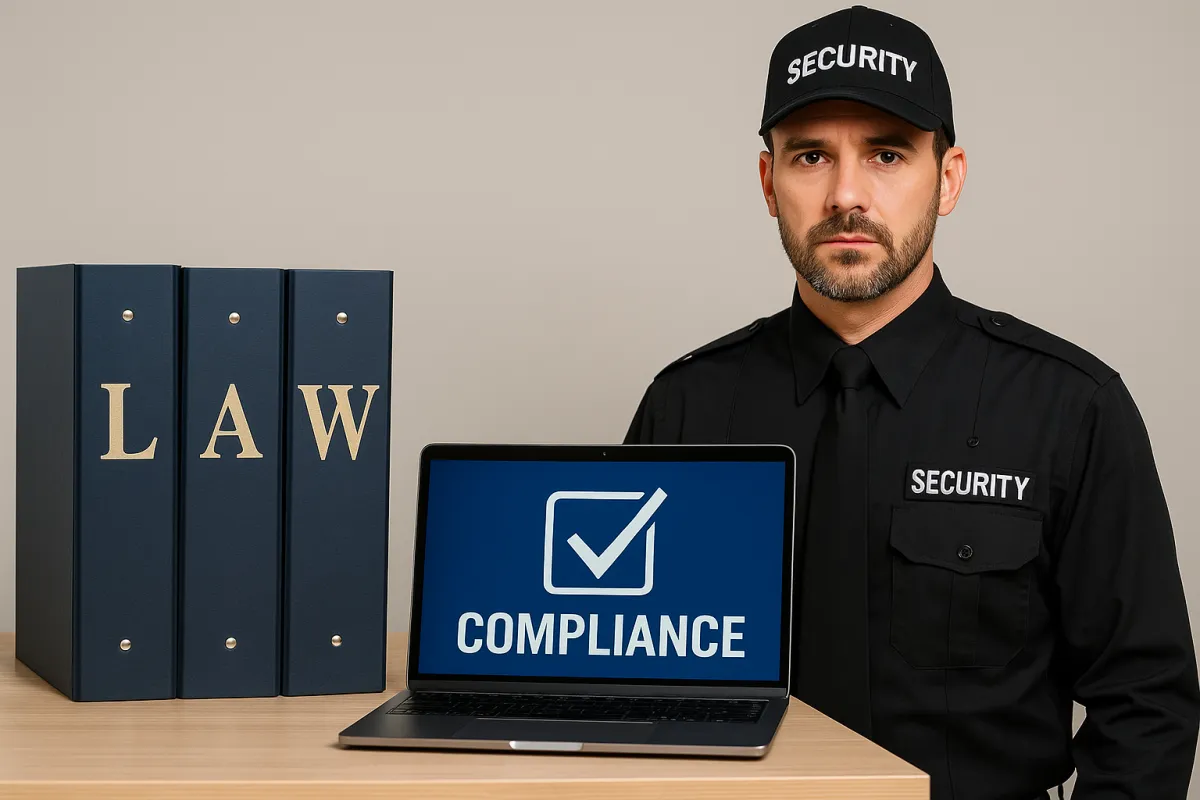Blog & News

The Legal Responsibilities of a Private Security Company
The Legal Responsibilities of a Private Security Company
Private security companies serve as a vital layer of protection for businesses, institutions, and individuals. Yet with that responsibility comes a web of legal obligations—ranging from licensing and use-of-force constraints to data privacy and employment law. Failing to meet these requirements can expose a security firm to regulatory penalties, civil liability, and reputational harm. At Steel Bison Security, we maintain rigorous compliance programs to ensure every client receives ethically and legally sound protection.
1. Licensing and Regulatory Compliance
1.1 State Licensing Requirements
Every state in the U.S. imposes licensing regulations on private security companies and individual officers. For example, in California, the Bureau of Security and Investigative Services (BSIS) mandates both company registration and individual guard licenses, requiring background checks and proof of training BSIS Licensing Requirements. Similar frameworks exist nationwide—such as the Texas Department of Public Safety’s licensing program Texas DPS Private Security and Florida’s Department of Agriculture and Consumer Services.
1.2 Insurance and Bonding
Licensed firms must carry general liability insurance, errors & omissions (E&O) coverage, and often workers’ compensation. These policies protect both the company and its clients in case of property damage, personal injury, or professional negligence. Many contracts also require a surety bond that guarantees performance and lawful conduct.
1.3 Ongoing Regulatory Reporting
Security firms often submit annual reports and renewal applications, disclosing changes in ownership, management, or scope of services. Failure to file timely renewals can result in license suspension or revocation.
2. Duty of Care and Negligent Security
2.1 Establishing a Duty of Care
By contracting with a client, a security company assumes a legal duty of care to protect against foreseeable harms. Courts have held firms accountable for “negligent security” when inadequate measures lead to injury—for instance, a night‐club security firm failing to intervene in an assault can be sued for negligence.
2.2 Standards of Reasonable Care
The expected standard mirrors what a reasonably prudent security professional would do under similar circumstances. This includes adequate staffing, proper training, and effective equipment. Documented post orders and SOPs (see Section 4) help demonstrate adherence to industry standards such as those published by ASIS International.
2.3 Civil Liability and Damages
Victims of negligence can pursue compensatory damages—medical expenses, lost wages, pain and suffering—and in egregious cases, punitive damages intended to punish willful misconduct. Security companies often face class‐action suits when systemic failures harm multiple individuals.
3. Use-of-Force and Legal Constraints
3.1 Applicable Laws
Private security officers are subject to state use-of-force statutes and local case law governing self-defense and defense of others. Unlike police, they lack arrest powers except for citizen’s arrests, making the legal thresholds for force even more stringent.
3.2 Use-of-Force Continuum
Agencies train officers on a continuum—from presence and verbal commands through non-lethal tools (batons, pepper spray) to lethal force only as a last resort. Training must comply with guidelines from bodies such as the International Association of Chiefs of Police (IACP).
3.3 Documentation and Reporting
Any force incident triggers mandatory incident reports, supervisory notifications, and often verbatim witness statements. Poor documentation can be fatal in civil or criminal proceedings.
4. Post Orders and Standard Operating Procedures
4.1 Essential Role of Post Orders
Post orders—site-specific instructions for each guard position—ensure consistency and legal compliance. They outline duties (patrol routes, checkpoint checks), emergency responses, and communication protocols. Properly drafted post orders demonstrate due diligence and help defend against negligence claims.
4.2 Developing and Updating Procedures
Security management must review and revise post orders whenever site conditions change (new construction, layout alterations) or regulations update. A robust version control system records each change and requires officer acknowledgment.
5. Privacy, Data Protection, and Surveillance
5.1 CCTV and Recording Laws
Video surveillance must respect reasonable expectation of privacy. For example, recording in restrooms or private offices without consent violates wiretapping and privacy statutes. Many states require visible signage to notify individuals of active cameras.
5.2 Data Security and Retention
Visitor logs, background check data, and incident reports often contain personal identifying information (PII). Compliance with laws like CCPA (California Consumer Privacy Act) and GDPR (for EU nationals) mandates secure storage, access controls, and defined retention periods.
5.3 Third-Party Vendor Management
When outsourcing data processing—such as cloud‐based access control logs—the security company remains liable under data protection agreements that bind vendors to equivalent safeguards.
6. Contractual Obligations and Scope of Services
6.1 Service Level Agreements (SLAs)
Contracts typically specify SLAs—response times, patrol frequency, report delivery. Breach of SLA can trigger financial penalties or contract termination.
6.2 Indemnification and Liability Caps
Most agreements include indemnification clauses protecting clients from claims arising from security company negligence. They also negotiate liability caps to limit exposure to a defined multiple of contract value or a fixed sum.
6.3 Insurance Requirements
Clients often require proof of insurance limits—e.g., $1 million per occurrence and $2 million aggregate—before granting site access or awarding contracts.
7. Employment Law and Human Resources
7.1 Fair Hiring Practices
Private security firms must comply with EEOC guidelines—avoiding discrimination in hiring, termination, and promotions. Background checks must honor FCRA (Fair Credit Reporting Act) requirements: providing disclosures, obtaining consent, and handling adverse‐action notices.
7.2 Wage and Hour Compliance
Guards are typically non-exempt under the FLSA, entitled to minimum wage and overtime for hours over 40 per week. Misclassifying employees as independent contractors invites Department of Labor audits and back-pay claims.
7.3 Workplace Safety and Harassment Policies
As employers, security companies must implement OSHA-mandated workplace safety programs and have anti-harassment policies with proper investigation procedures.
8. Training, Certification, and Continuing Education
8.1 Mandated Training
State boards often require initial training—covering legal powers, use of force, report writing—and periodic in-service updates. For armed personnel, recurring firearms requalification is mandatory.
8.2 Professional Standards
Pursuing advanced credentials—such as the ASIS Certified Protection Professional (CPP)—shows a commitment to best practices and elevates the firm’s competitive standing.
8.3 Record-Keeping and Audits
Firms must maintain detailed training records for each officer: course content, instructor credentials, and completion dates. Regulatory bodies may audit these files at any time.
9. Emergency Response, Reporting, and Coordination
9.1 Incident Notification
Contracts and regulations often specify notification timelines—for example, notifying a client within 15 minutes of a security breach or major medical incident.
9.2 Law Enforcement Liaison
Private security officers may coordinate with local police under Memoranda of Understanding (MOUs). Officers must understand the limits of their authority and defer to sworn officers in investigations.
9.3 After-Action Reviews
Documenting and analyzing each incident against SOPs identifies procedural gaps and informs continuous improvement—a critical component of legal risk management.
10. Consequences of Non-Compliance
10.1 Regulatory Penalties
Unlicensed operations, lapsed insurance, or failure to meet training mandates can lead to fines, license suspension, or forced cessation of business.
10.2 Civil Litigation
Negligent security claims, assault or false-arrest suits, privacy invasion actions, and wage-and-hour lawsuits can result in substantial damages, legal fees, and reputational damage.
10.3 Contractual Damages
Breach of SLAs and indemnification obligations may trigger contractual liquidated damages, eroding profitability and client trust.
11. Best Practices for Legal Compliance
Maintain a Compliance Calendar: Track license renewals, insurance expirations, and training deadlines.
Implement a Robust Policy Library: Centralize all SOPs, post orders, and legal procedures with version control and officer acknowledgments.
Conduct Regular Audits: Internal and third-party reviews of licensing, training, and incident management.
Engage Legal Counsel: Consult attorneys specializing in security law to draft contracts, review policies, and defend against claims.
Foster a Culture of Accountability: Encourage officers to report compliance concerns and reward adherence to best practices.
12. How Steel Bison Security Can Help
At Steel Bison Security, we uphold the highest legal and ethical standards:
End-to-End Licensing Management: We handle all state and local licensing, renewals, and filings.
Comprehensive Training Programs: Initial and refresher courses aligned with regulatory requirements and ASIS best practices.
Contract Drafting & Review: We work with your legal team to craft SLAs, indemnification clauses, and insurance specifications.
Compliance Audits: Regular internal checks and third-party assessments ensure ongoing adherence.
Incident Management Support: Real-time coordination with law enforcement and post-incident reviews to strengthen future responses.
Visit our contact page to learn how we can manage your legal obligations so you can focus on your core business.
Conclusion
The legal responsibilities of a private security company are complex and far-reaching—spanning licensing, duty of care, use-of-force limits, data privacy, employment law, and beyond. Non-compliance risks fines, lawsuits, and reputational harm, while a robust compliance program enhances credibility and reduces liability. By partnering with a provider like Steel Bison Security that embeds legal best practices into every level of operation, clients gain both peace of mind and superior protection.
Ensure your security operations meet every legal requirement—reach out to Steel Bison Security today.

EMAIL ADDRESS
OFFICE NUMBER
OFFICE ADRESS
(WA) 11900 NE First St STE 3066, Bellevue, Wa 98005
(WY) 30 N. Gould St STE R, Sheridan, Wy 82801
Copyright 2024 Steel Bison Security Services
